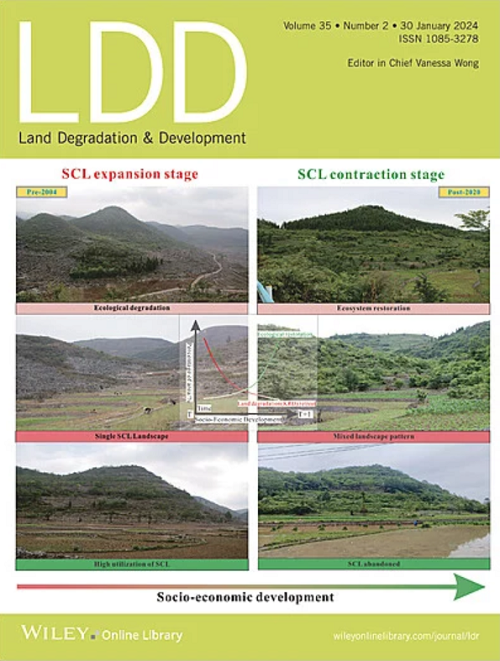新型城镇化与水资源安全的动态耦合分析——基于系统动力学的中国实证研究
IF 3.7
2区 农林科学
Q2 ENVIRONMENTAL SCIENCES
引用次数: 0
摘要
城市化和水资源管理是许多国家面临的重大挑战,特别是在像中国这样快速发展的经济体中。本文采用系统动力学(SD)模型研究了新型城镇化(NTU)与水资源安全(WRS)之间的动态耦合关系。本文模拟了四种不同的发展情景(基线情景、绿色低碳情景、高增长情景和协调发展情景),以评估城市化轨迹和水管理政策对水资源消耗、水安全和生态可持续性的影响。该模型纳入了人均GDP、城市化率、水资源短缺和污染等关键变量,以捕捉城市化与水资源动态之间的反馈循环。研究结果表明,将水资源效率措施与生态保护政策相结合的协调发展情景是实现长期水安全的最佳方案。相比之下,高增长情景导致水需求增加和对水资源的巨大压力,而绿色低碳情景强调通过减少水消耗和最小化环境影响实现可持续增长。本研究对经济增长、人口增长和水资源可持续性之间的权衡提供了有价值的见解,为实现均衡的城市化和可持续的水资源管理提供了政策建议。研究结果强调,需要制定综合政策,将城市增长管理与节水和生态保护结合起来。本文章由计算机程序翻译,如有差异,请以英文原文为准。
Dynamic Coupling Analysis of New‐Type Urbanization and Water Resources Security: A System Dynamics‐Based Empirical Study From China
Urbanization and water resource management are critical challenges facing many countries, especially in rapidly developing economies like China. This study investigates the dynamic coupling between new‐type urbanization (NTU) and water resources security (WRS), employing a system dynamics (SD) modeling approach. Four distinct development scenarios (baseline scenario, green low‐carbon scenario, high growth scenario, and coordinated development scenario) are simulated to evaluate the impact of urbanization trajectories and water management policies on water consumption, water security, and ecological sustainability. The model incorporates key variables such as per capita GDP, urbanization rate, water scarcity, and pollution to capture the feedback loops between urbanization and water resource dynamics. The findings indicate that the coordinated development scenario, which integrates water efficiency measures and ecological protection policies, demonstrates the most promising outcomes for long‐term water security. In contrast, the high growth scenario leads to increased water demand and significant pressures on water resources, whereas the green low‐carbon scenario emphasizes sustainable growth by reducing water consumption and minimizing environmental impacts. This study provides valuable insights into the trade‐offs between economic growth, population increase, and water resource sustainability, offering policy recommendations for achieving balanced urbanization and sustainable water management. The results underscore the need for integrated policies that combine urban growth management with water conservation and ecological protection.
求助全文
通过发布文献求助,成功后即可免费获取论文全文。
去求助
来源期刊

Land Degradation & Development
农林科学-环境科学
CiteScore
7.70
自引率
8.50%
发文量
379
审稿时长
5.5 months
期刊介绍:
Land Degradation & Development is an international journal which seeks to promote rational study of the recognition, monitoring, control and rehabilitation of degradation in terrestrial environments. The journal focuses on:
- what land degradation is;
- what causes land degradation;
- the impacts of land degradation
- the scale of land degradation;
- the history, current status or future trends of land degradation;
- avoidance, mitigation and control of land degradation;
- remedial actions to rehabilitate or restore degraded land;
- sustainable land management.
 求助内容:
求助内容: 应助结果提醒方式:
应助结果提醒方式:


